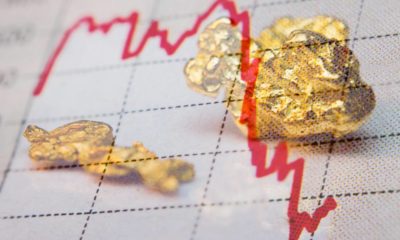Business
Britain: Is All That Glitters Gold?

If Britain leaves the European Union on June 23rd, two things will increase.
Firstly, Britain’s welfare bill will go up, with Britain’s 73 MEP’s (Members of the European Parliament) having to come to terms with joblessness. Secondly, and more significantly, gold could see a surge in value.
Read on to find out why.
Bedrock of Stability, with Short-Term Volatility
In a constantly changing world, gold has proven to be a remarkably stable asset for investors.
While certainly price volatile, it has remained a popular medium of exchange, thanks to its prestige and its non-corrosive nature, meaning it lasts practically forever.
Below is a timeline of the price of gold in the 20th century.
While fluctuating markedly over time, we can see that it has remained a valuable asset.

It peaked in 2011 after the financial crisis, seeing a high of $2000 an ounce: the crisis stripped assets and funds of their values, leading to trillions of dollars’ worth of losses.
Since then, it has seen a steady decline, especially in the last three years, with a trough of $1,050 an ounce in November last year.
Uncertainty is Gold’s Best Friend
Financial markets work on security.
If there is a guarantee of economic growth, job creation, and wage rises, investors will continue to pour money into economies with the expectations that the economic climate will be favorable, and they will see a return.
In the eyes of shareholders and investors, events like Brexit throw a spanner in the works.
The IMF has predicted a shrinking of the UK economy in the region of 1-9%, a claim which has been largely ratified by the following important institutions and individuals:
- The World Bank
- The European Central Bank
- The Institute for Fiscal Studies
- President Obama
Since Britain is the fifth-largest economy and fifth-largest manufacturer, the state of its economy is integral to the world market.
If Britain feels an economic blow, everyone feels the pinch.
Thus, financial assets, investments, mortgages, and bonds could lose value, so investors will turn to gold.
With demand for gold going up, the price increases accordingly.
Casey Research’s graph (below) shows that since governments started selling off gold in the early 2000s, the price of gold has gone up during recessions:

It’s not just Brexit
Two things affecting global financial market stability right now are the weakness of the Chinese and American economies, and subsequent stock market turmoil.
Chinese economic growth has consistently slowed over the last few years, with exports decreasing.
Chinese business news outlets stated today that a full recovery was a long way off, and global as well as Asian stock markets are reacting cautiously.
News of bad job creation in the US economy has also added to a very vigilant climate amongst investors, with the Federal Reserve’s hiking of interest rates last year not giving the confidence boost that many hoped it would.
The report was followed by a hike in gold prices to $1,257 an ounce.
[ms_divider style=”normal” align=”left” width=”100%” margin_top=”30″ margin_bottom=”30″ border_size=”5″ border_color=”#f2f2f2″ icon=”” class=”” id=””][/ms_divider]
[ms_featurebox style=”4″ title_font_size=”18″ title_color=”#2b2b2b” icon_circle=”no” icon_size=”46″ title=”Recommended Link” icon=”” alignment=”left” icon_animation_type=”” icon_color=”” icon_background_color=”” icon_border_color=”” icon_border_width=”0″ flip_icon=”none” spinning_icon=”no” icon_image=”” icon_image_width=”0″ icon_image_height=”” link_url=”https://offers.thecapitalist.com/p/58-billion-stock-steal/index” link_target=”_blank” link_text=”Click Here To Find Out What It Is…” link_color=”#4885bf” content_color=”” content_box_background_color=”” class=”” id=””]This one stock is quietly earning 100s of percent in the gold bull market. It's already up 294% [/ms_featurebox]
[ms_divider style=”normal” align=”left” width=”100%” margin_top=”30″ margin_bottom=”30″ border_size=”5″ border_color=”#f2f2f2″ icon=”” class=”” id=””][/ms_divider]
The Importance of European Unity
The EU is in the midst of a political and economic crisis.
There is a talk of a third bailout for Greece on the way, weak economic growth everywhere except Britain and Germany, and a migrant crisis threatening to rip the union apart.
The departure of one of the EU’s net contributors could spark off a chain reaction, leading to the disintegration of the world’s biggest single market: the EU has a combined nominal GDP value of $18.5 trillion, more than the United States’ $17.4 trillion.
Were this single market to unravel or even simply be weakened by Brexit, the ramifications would be huge.
The governor of the Bank of England, Mark Carney, recently claimed it could even lead to another recession.
And when did gold last enjoy huge growth in its value? That’s right, the 2008 financial crisis and subsequent recession.
Surely Not?
For a while, most polls have put remain in the lead in the UK’s EU referendum.
A graphic of the following poll of polls shows that Remain has usually held a few-point lead over Leave, with several periods of a reversal or equaling of percentages occurring sporadically, with the most recent showing Leave ahead:

While polls should be taken as indications at best, the bottom line is, it is an incredibly close race.
One pivotal moment could change everything.
Another Islamist terrorist attack on European soil will undoubtedly increase anti-immigration sentiment while an announcement by a significant employer could sway those with more economic and job security-focused predispositions.
In Conclusion: Expect Panic, But Not Disaster
Last year, the Greek financial crisis was believed by some to threaten the very integrity of the Eurozone.
While full meltdown didn’t happen thanks to a deal being struck, ripples were felt and for a while, the situation looked apocalyptic.
The Eurozone is worth about $14 trillion while Greece is around a quarter of a trillion.
That means Greece represents about 1.7% of the Eurozone.
Now the single EU market as a whole is $18.5 trillion, with Britain’s GDP totaling $2.7 trillion.
That means, Britain almost represents one-sixth of its total, 14.5% to be precise.
If Greece’s future was integral to the Eurozone, imagine how integral Britain’s is to the single market.
However, Britain will almost certainly gain access to the single market.
It trades too much with the EU for both sides to blow this one.
However, with initial uncertainty in between Brexit and the subsequent renegotiations’ completion (which could take anywhere from months to years), expect paranoid investors and shareholders to fear the worst.
And what do people do when they fear the worst?
They buy gold.















